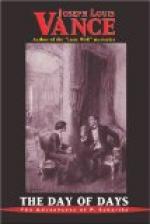Already town-cars, carriages, and private ’busses were being called for and departing with their share of the more seasoned and sober-sided revellers, to whom bed and appetite for breakfast had come to mean more than a chance to romp through a cotillion by the light of the rising sun—to say discreetly little or nothing of those other conveyances which had borne away their due proportion of far less sage and by no means sober-sided ones, who yet retained sufficient sense of the fitness of things to realise that bed followed by matutinal bromides would be better for them than further dalliance with the effervescent and evanescent spirits of festivity.
More and more frequently the elevators, empty but for their attendants, were flying up to the famous ball-room floor of the Bizarre, to descend heavy-laden with languid laughing parties of gaily-costumed ladies and gentlemen no less brilliantly attired—prince and pauper, empress and shepherdess, monk, milkmaid, and mountebank: all weary yet reluctant in their going.
And at this hour a smallish gentleman, in an old-style Inverness opera-coat that cloaked him to his ankles, with an opera hat set jauntily a wee bit askew on his head, a mask of crimson silk covering his face from brows to lips, slipped silently like some sly, sinister shadow through the Fifth Avenue portals of the Bizarre, and shaped a course by his wits across the lobby to the elevators, so discreetly and unobtrusively that none of the flunkeys in attendance noticed his arrival.
In effect, he didn’t arrive at all, but suddenly was there.
A car, discharging its passengers before the smallish gentleman could catch the eye of its operator, flew suddenly upward in the echo of a gate slammed shut in his face; and all the other cars were still at the top, according to the bronze arrows of their tell-tale dials. The late arrival held up patiently; but after an instant’s deliberation, doffed his hat, crushed it flat, slipped out of his voluminous cloak, and beckoned a liveried attendant.
In the costume thus disclosed, he cut an impish figure: “Satan on the half-shell,” Peter Kenny had christened him.
A dress coat of black satin fitted P. Sybarite more neatly than him for whom it had been made. The frilled bosom of his shirt was set with winking rubies, and the lace cuffs at his wrists were caught together with rubies—whether real or false, like coals of fire: and ruby was the hue both of his satin mask and his satin small-clothes. Buckles of red paste brilliants burned on the insteps of his slender polished shoes with scarlet heels; and his snug black silk stockings set off ankles and calves so well-turned that the Prince of Sin himself might have taken pride in them. For boutonniere he wore a smouldering ember—so true an imitation that at first he himself had hesitated to touch it. Literally to crown all, his ruddy hair was twisted upward from each temple in a cornuted fashion that was most vividly picturesque.




